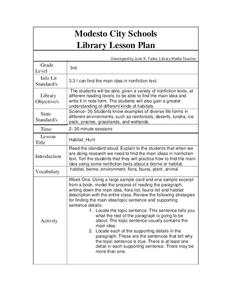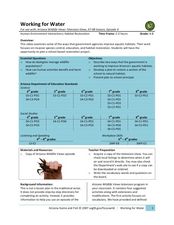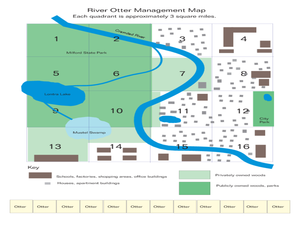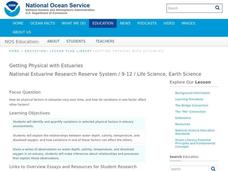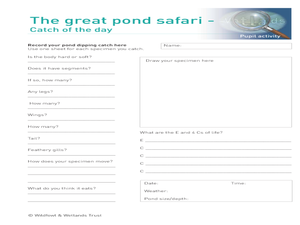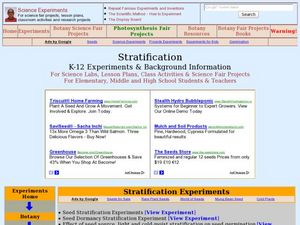Curated OER
There Is No Place Like Home
In this language arts worksheet, students read the story about the beaver and then answer the seven questions for reading comprehension.
Curated OER
Everglades Fun
In this science and geography worksheet, students investigate the vocabulary pertaining to the ecosystem of the Everglades in South Florida. Students unscramble 9 words and find 12 words in a word search puzzle.
Curated OER
Duck Flyways Quiz
In this science quiz worksheet, students read about ducks migrating along flyways. They answer 5 questions based on a map of the United States. They answer true and false, and multiple choice questions.
Curated OER
Habitat Hunt
Third graders read several nonfiction texts and practice finding the main idea for the text as well as learn about various habitats. In this main idea lesson plan, 3rd graders read several nonfiction texts and make habitat cards....
Curated OER
Working for Water
Students examine the ways that government works to help improve aquatic habitats. In this water habitats lesson students view a video and plan a school restoration project.
Curated OER
Caring for the Land
Students study soil management and issues relating to agriculture and the environment. In this agriculture and environment instructional activity, students define the terms farmer, environmentalist, and activist. Students use a Venn...
Curated OER
Too Many Otters
Second graders investigate the habitat of otters. In this animal science instructional activity, 2nd graders role play the job of wildlife biologists and try to manage the otter population. Students use a map to track their specific...
Curated OER
Life As A Tree
Third graders design a plate to represent the three parts of a tree. In this tree parts lesson plan, 3rd graders learn about the functions of each part and design the plate to resemble the rings of the tree.
Curated OER
There is Room for All
Students create a poster about the three main uses of forest lands. In this forest lesson plan, students focus on its economic use, environmental use, and recreation use.
Curated OER
For the Last 10,000 Years...
Learners study the National Estuarine Research Reserve System and discuss why they have important cultural artifacts. In this estuarine weather lesson plan students use the Internet and complete a worksheet.
Curated OER
Getting Physical with Estuaries
Students study estuaries and how the physical factors change over time. In this investigative lesson plan students use a website to gain knowledge of estuaries then in groups they create and present their charts.
Curated OER
Oil Spill
In this reading comprehension worksheet, students read a 7-paragraph article about the 2010 Gulf Oil Spill and respond to 5 short answer questions. Vocabulary words and definitions are included.
Curated OER
Why Is Climate Important to Growing Rice?
Third graders determine the location of major rice producing states in the United States. In this rice production lesson, 3rd graders locate the longitude and latitude of each rice producing state. They color the states and indicate...
Curated OER
Why Do Geese Fly South For the Winter?
Fifth graders examine migration by tracing animal migration routes on a map. For this animal life lesson, 5th graders observe a map of North America and read about the migration patterns of geese. Students trace the path most...
Curated OER
Birds
Students list marine birds in their area and report on the threats made to these species. In this marine life lesson students compare bird count data and argue either for or against its accuracy.
Curated OER
Floods
Students investigate how hurricanes impact a stream flow. In this floods instructional activity students predict the impact of storms on animals and interpret data.
Curated OER
Catch Up With John Smith
In this video worksheet, students view a video online titled Catch Up With John Smith and fill in the blanks to sentences about it after viewing it. Students complete 20 sentences.
Curated OER
Develop a Bird Feeder Watch List
Students explore biology by identifying animals on their school ground. In this bird species lesson, students create and utilize a simple bird feeder to attract birds near their classroom at which point they observe the color, size and...
Curated OER
Investigating Fresh Water Ecosystems
Sixth graders examine the fresh water ecosystems. In this environmental lesson, 6th graders work in groups to collect information about a fresh water ecosystem and report their findings to the class in the form of a brochure.
Curated OER
Human Impact on the Environment
In this environmental science worksheet, students complete a crossword puzzle with 26 questions about human impact on the environment.
Curated OER
Vocabulary: Kansas Prairies
Students explore the ecosystem by reviewing scientific vocabulary terms. In this environmental awareness lesson, students identify the differences between abiotic and biotic factors and their relationship to the Earth. Students define...
Curated OER
Pond Safari
Young scholars investigate organisms and animals by examining a nearby pond. In this ecosystem lesson, students participate in a field trip to a local pond where they utilize a net to gather animals, plants and pollution items, Young...
Curated OER
Mighty Macroinvertebrates
Seventh graders identify the names and features of macroinvertebrates found in Turtle River. In this ecology lesson students use digital microscopes and take pictures of invertebrates.
Curated OER
Stratification
Students study the process of stratification and seed dormancy. In this germination lesson students prepare a medium in which to grow seeds.
Other popular searches
- Louisiana Wetlands
- Animal Adaptations +Wetlands
- Animal Adaptations Wetlands
- Freshwater Wetlands
- Animals of the Wetlands
- Wetlands Water Cycle Diagram
- Watersheds and Wetlands
- Inland Wetlands
- Project Wetlands
- Wetland Soil Classification
- Wetlands Habitat
- Abc Book on Wetlands



